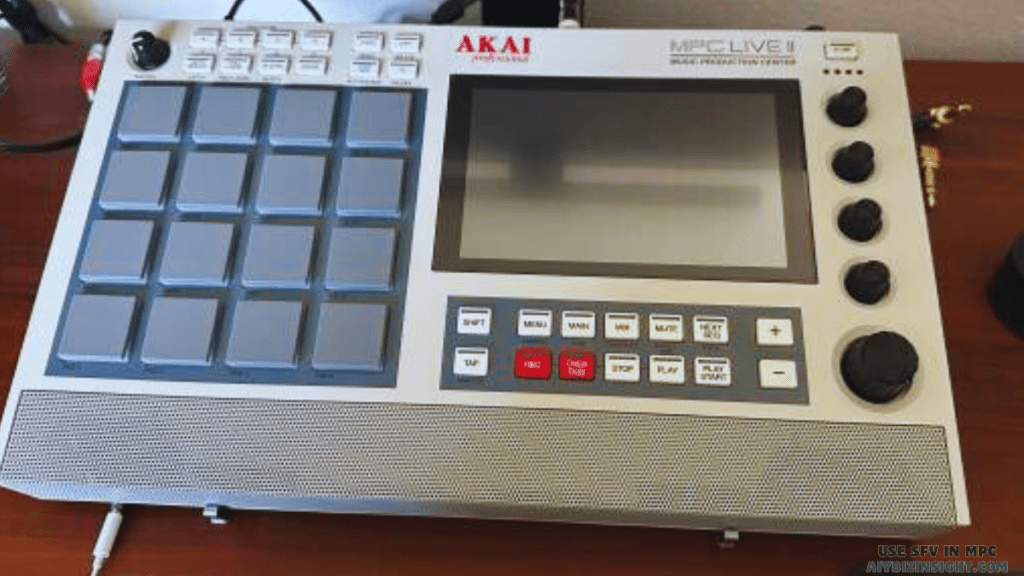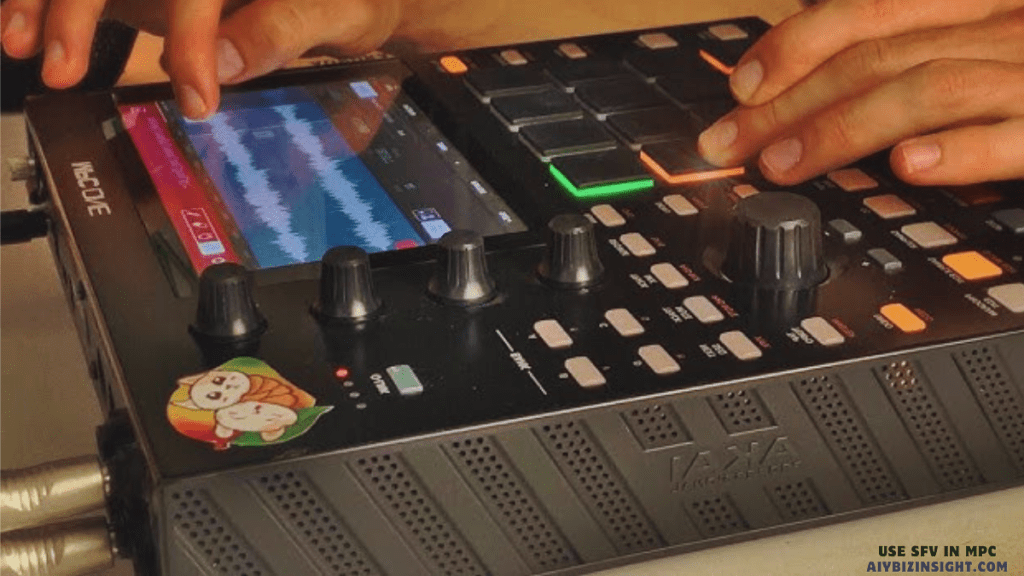- 1 1. Introduction For Use SFV in MPC
- 1.1 2. Understanding MPC and SFV
- 1.2 3. Why SFV is Essential in MPC Workflows
- 1.3 4. Setting Up SFV for MPC
- 1.4 5. Integrating SFV with MPC Software
- 1.5 6. Advantages of Using SFV in MPC Workflows
- 1.6 7. Advanced Tips for Using SFV and MPC Together
- 1.7 8. Troubleshooting Common Issues
- 1.8 9. Conclusion
- 1.9 FAQs
1. Introduction For Use SFV in MPC
The Importance of Workflow Efficiency in Music Production
Use SFV in MPC in music production is vital to creating high-quality beats and tracks without interruptions. Producers, especially in genres like hip-hop and electronic music, need tools and workflows that enable them to create seamlessly without constantly dealing with technical issues. Efficient production not only enhances creative freedom but also ensures timely project completion. In today’s industry, where competition is high, artists who can produce reliably and quickly gain a significant advantage.
Role of MPC in Modern Production
Music Production Center (MPC) devices and software have long been the backbone of beat-making, valued for their versatility and functionality. From the early hardware models to the sophisticated software systems used today, MPCs allow producers to sequence, layer, and arrange samples with ease. MPC’s strength lies in its ability to handle complex arrangements and layer multiple sound sources effortlessly, making it a favorite among hip-hop, electronic, and pop producers. In short, MPCs bring together sound design, sequencing, and beat-making into a cohesive tool that supports diverse music styles.
SFV Files for Audio Integrity
In any music production, maintaining the audio quality of samples is paramount. This is where SFV (Sample File Verification) files come in, acting as a quality control mechanism that protects the integrity of each audio file. SFV files store checksum data for each audio file, allowing producers to verify that samples are unaltered and uncorrupted. This process is essential for maintaining the authenticity of audio files, especially when handling large libraries or collaborating remotely. Without SFV verification, corrupted or altered files could compromise the final product’s quality.
2. Understanding MPC and SFV
What is MPC?
MPC (Music Production Center) is a line of hardware and software developed by Akai that has revolutionized music production. The device initially debuted as a hardware unit, allowing users to sample, sequence, and manipulate audio in real time. Today, MPC also includes advanced software versions, such as Use SFV in MPC Beats, that provide the same powerful tools in a digital format. MPCs are prized for their responsive pads, sequencing capabilities, and sampling features, which make them ideal for genres where rhythm and sample manipulation are key.
- Beat-making: MPCs are especially popular in hip-hop production, where they’re used for creating beats by layering kicks, snares, and hi-hats.
- Sampling: MPCs are equipped with sampling functions that allow users to slice, chop, and rearrange samples, making it easy to create unique loops.
- Sequencing: With powerful sequencing capabilities, Use SFV in MPC helps producers arrange loops, sounds, and samples in complex, structured ways, which is critical for producing high-quality tracks efficiently.
What is SFV and How Does It Work?
SFV (Sample File Verification) is a digital tool that creates checksums for files, which can later be used to verify file authenticity. In music production, SFV helps confirm that audio samples haven’t been altered or corrupted. The SFV file contains checksum data, which acts as a reference point; each time an audio file is checked against this reference, the software confirms whether the file has changed.
- Authenticity: SFV checksums maintain the authenticity of samples by identifying any tampering or corruption that may have occurred.
- Data Integrity: In collaborative projects, SFV prevents data inconsistencies, ensuring that all users access and use unaltered, high-quality audio files.

3. Why SFV is Essential in MPC Workflows
Ensuring Sample Integrity
Corrupted audio samples can lead to a variety of issues, from glitchy sounds to playback errors. By verifying samples with Use SFV in MPC files, producers can prevent corrupted files from entering their projects. This is particularly important in genres that use extensive sampling, where each audio file must be pristine. Use SFV in MPC files makes it easy to identify damaged samples early on, preserving the audio quality and saving time in troubleshooting later.
Maintaining Consistency in Collaborations
In modern production, collaborative workflows are common, with multiple producers often working on the same track. Use SFV in MPC plays a critical role here, as it ensures that every collaborator has access to the same, unaltered files. This consistency is crucial for maintaining sound quality across different stages of the production process and avoids potential issues from mismatched samples.
Reducing Playback Issues
Unchecked audio files may introduce glitches or dropouts, especially in digital setups where each file interacts with others in real-time. SFV files enable producers to verify audio integrity, reducing the chances of errors that could disrupt playback. With SFV checks in place, producers can work confidently, knowing that their samples won’t cause unexpected issues during live or recorded playback.
4. Setting Up SFV for MPC
Generating SFV Files for Audio Libraries
To set up SFV files for your audio library, you’ll need to create SFV files that store checksums for each sample. This process can be done manually or with the help of SFV tools that generate checksums for multiple files in bulk. Once created, these SFV files can be stored alongside your samples, allowing for quick integrity checks as needed. Regularly generating SFV files for new samples or custom libraries can prevent future issues.
Automating SFV Checks
Automation is a significant time-saver in SFV workflows. With third-party tools, you can set up scheduled or batch SFV verification, which checks multiple files simultaneously. By integrating SFV automation into your workflow, you’ll be able to verify new samples as they’re imported into your MPC software, ensuring each one meets quality standards without interrupting your creative flow.
Tools and Software Recommendations
To create and verify SFV files, several reliable tools are available. QuickSFV and HashCheck are popular options that offer batch processing and file integrity checks compatible with MPC workflows. Each of these tools allows producers to manage audio libraries easily, maintaining consistent quality across large sample collections.
5. Integrating SFV with MPC Software
Organizing Verified Samples within MPC
Keeping SFV-verified samples organized within Use SFV in MPC software can greatly improve efficiency. Producers should categorize their SFV-verified samples by type, genre, or project, making it easy to locate and use these high-integrity files. This organization reduces search time and ensures that only high-quality samples are used in production.
Creating SFV Checks During Imports
Incorporating SFV checks into the import process is an effective way to catch issues before they interfere with a project. By setting up SFV verification as part of the sample import process, producers can ensure that each new sample added to MPC software has been quality-checked, avoiding potential problems with corrupted files.
Streamlining SFV Workflow with MPC’s File Management Tools
MPC software offers robust file management tools that producers can leverage to integrate SFV verification seamlessly. By organizing and labeling verified samples, these tools help streamline the SFV process, enabling efficient and easy access to high-quality audio files.
6. Advantages of Using SFV in MPC Workflows
Enhanced Audio Quality
SFV verification ensures high-fidelity audio by preventing the inclusion of corrupted or low-quality samples. Verified samples maintain better clarity, tonal consistency, and overall production quality, making a noticeable difference in the final output.
Increased Production Efficiency
Using SFV eliminates time-consuming troubleshooting by ensuring all samples are verified for quality before use. This proactive approach keeps production moving smoothly, reducing the chances of interruptions and allowing producers to focus on the creative aspects.
Security in Collaborative Environments
In collaborative music projects, SFV files provide a layer of security by ensuring that all participants are using identical, untampered audio files. This consistency reduces miscommunication and avoids errors that could compromise the project’s quality.
7. Advanced Tips for Using SFV and MPC Together
Batch Processing SFV for Large Libraries
For producers with extensive audio libraries, batch-processing SFV verification can save valuable time. By verifying multiple samples in a single process, producers can ensure that their entire library meets quality standards, making it easier to integrate samples into projects without issues.
Integrating with Cloud Storage for Remote Collaborations
When working remotely, SFV files ensure that collaborators receive verified, high-quality samples. By using SFV checks with cloud storage services, producers can confirm the integrity of shared files, preserving quality across multiple locations.
Ensuring the Integrity of Custom Sample Packs
When creating custom sample packs for distribution or personal use, SFV verification provides an extra layer of assurance. Verified packs are more reliable and appealing to end users, whether they’re collaborating producers or sample pack customers.

8. Troubleshooting Common Issues
Handling SFV Verification Errors
If an SFV verification fails, first compare the current sample with an original backup or use a backup SFV file. In case the file is corrupted, re-downloading or re-sampling may be necessary. Identifying the issue early prevents the damaged sample from compromising project quality.
Addressing Compatibility Issues
Certain SFV software may have compatibility issues with MPC software. To resolve these, producers should check for alternative SFV tools or ensure MPC software is updated to its latest version. Regular software updates often resolve compatibility issues, streamlining the verification process.
9. Conclusion
Recap of SFV’s Role in Enhancing MPC Workflows
Integrating Use SFV in MPC workflows adds significant value by maintaining audio quality, avoiding playback errors, and enhancing collaborative efficiency. This combination allows producers to create music confidently, knowing each sample is pristine and ready for production.
Final Tips for Efficient Beat Production
To maintain production efficiency, producers should make SFV verification a standard part of their workflow. By organizing, verifying, and managing samples with SFV, and combining this with MPC’s capabilities, producers can create a smooth, reliable production experience that consistently delivers high-quality music.
FAQs
What is SFV, and why is it essential for MPC users?
SFV (Sample File Verification) is a tool that verifies the integrity of audio samples by creating and checking checksums. For MPC users, it’s crucial because it ensures audio files remain uncorrupted, safeguarding the quality of beats and samples, especially in collaborative projects.
How does integrating SFV with MPC improve production quality?
By integrating SFV, MPC users can maintain pristine audio quality, prevent playback errors, and reduce troubleshooting time. Verified samples are free from glitches and data corruption, resulting in a more reliable, efficient production workflow.
Can SFV enhance collaboration in remote production?
Yes, SFV is invaluable for remote music projects. It ensures all collaborators access the same high-quality, unaltered audio files, reducing mismatches or discrepancies and maintaining the consistency of shared files on cloud platforms.
